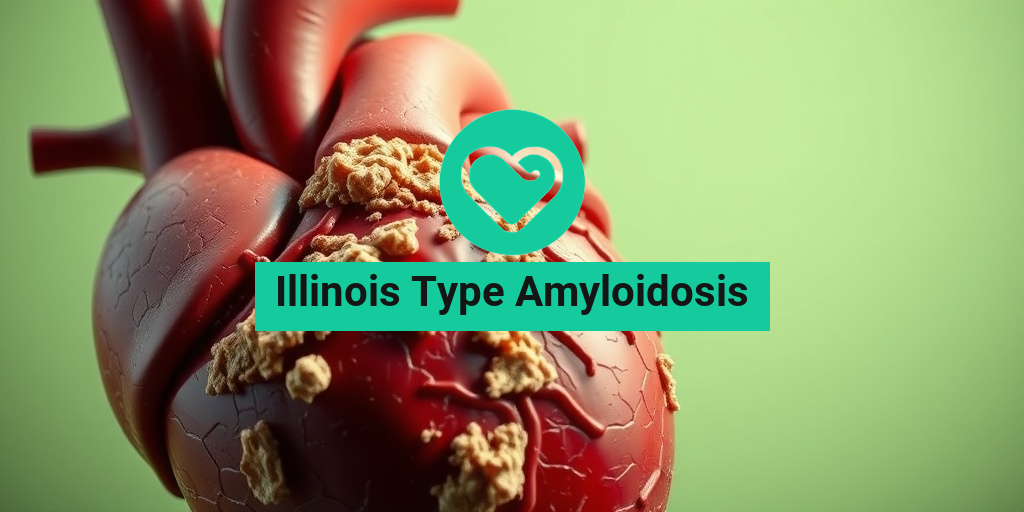What Is Illinois Type Amyloidosis?
Illinois Type Amyloidosis, often referred to simply as amyloidosis, is a rare and complex condition characterized by the abnormal accumulation of amyloid proteins in various tissues and organs. This buildup can disrupt normal function and lead to serious health complications. While amyloidosis can occur in different forms, Illinois Type Amyloidosis specifically pertains to cases identified within the state of Illinois, often linked to specific genetic or environmental factors.
Understanding Amyloidosis
Amyloidosis is not a single disease but rather a group of disorders that result from the deposition of amyloid, a protein that can misfold and aggregate. These proteins can accumulate in organs such as the heart, kidneys, liver, and nervous system, leading to a range of health issues. The Illinois variant may have unique characteristics or prevalence patterns that differentiate it from other types.
Types of Amyloidosis
There are several types of amyloidosis, including:
- AL Amyloidosis: Caused by abnormal plasma cells producing light chain proteins.
- AA Amyloidosis: Associated with chronic inflammatory diseases, where serum amyloid A protein accumulates.
- Hereditary Amyloidosis: Genetic mutations lead to the production of abnormal proteins.
- Wild-Type Amyloidosis: Often seen in older adults, where transthyretin protein misfolds.
Illinois Type Amyloidosis may fall under one of these categories, but it is essential to consult healthcare professionals for accurate diagnosis and treatment options.
Symptoms of Illinois Type Amyloidosis
The symptoms of Illinois Type Amyloidosis can vary significantly depending on the organs affected and the extent of amyloid deposition. Early detection is crucial for effective management, so being aware of the symptoms is vital.
Common Symptoms
Some of the most common symptoms associated with Illinois Type Amyloidosis include:
- Fatigue: A persistent feeling of tiredness that does not improve with rest.
- Swelling: Edema in the legs, ankles, or abdomen due to fluid retention.
- Shortness of Breath: Difficulty breathing, especially during physical activity.
- Heart Issues: Irregular heartbeats or heart failure symptoms due to amyloid deposits in the heart.
- Nerve Damage: Tingling, numbness, or pain in the hands and feet, indicating peripheral neuropathy.
- Kidney Problems: Proteinuria (excess protein in urine) leading to kidney dysfunction.
Recognizing the Signs
It’s important to note that symptoms can develop gradually and may be mistaken for other health conditions. If you or someone you know is experiencing a combination of these symptoms, it is crucial to seek medical advice. Early diagnosis can significantly improve treatment outcomes and quality of life.
When to Seek Help
If you notice persistent symptoms such as unexplained fatigue, swelling, or changes in heart rhythm, don’t hesitate to consult a healthcare professional. They can perform the necessary tests to determine if Illinois Type Amyloidosis or another condition is the cause of your symptoms.
For more information on amyloidosis and related health concerns, consider visiting Yesil Health AI, a valuable resource for evidence-based health answers.
Conclusion
Illinois Type Amyloidosis is a complex condition that requires awareness and understanding. By recognizing the symptoms and seeking timely medical advice, individuals can manage their health more effectively. Stay informed and proactive about your health, and remember that resources like Yesil Health AI can provide essential information and support. 🌟

Causes and Risk Factors
Illinois Type Amyloidosis, a rare but serious condition, arises when abnormal proteins called amyloids accumulate in various tissues and organs. Understanding the causes and risk factors associated with this disease is crucial for early detection and management.
What Causes Illinois Type Amyloidosis?
The primary cause of Illinois Type Amyloidosis is the overproduction of amyloid proteins, which can occur due to several underlying conditions. Here are some of the main causes:
- Chronic Inflammatory Diseases: Conditions such as rheumatoid arthritis and inflammatory bowel disease can lead to the production of amyloid proteins.
- Multiple Myeloma: This type of blood cancer is a significant contributor to amyloidosis, as it causes the body to produce abnormal plasma cells that create amyloid proteins.
- Genetic Factors: Certain inherited conditions, like familial amyloid polyneuropathy, can predispose individuals to develop amyloidosis.
- Age: The risk of developing Illinois Type Amyloidosis increases with age, particularly in individuals over 60.
Risk Factors for Developing Illinois Type Amyloidosis
While anyone can develop Illinois Type Amyloidosis, certain factors can increase the likelihood of its occurrence:
- Family History: A family history of amyloidosis or related conditions can elevate your risk.
- Chronic Conditions: Individuals with chronic inflammatory diseases or blood disorders are at a higher risk.
- Gender: Men are generally more likely to develop amyloidosis than women.
- Ethnicity: Certain ethnic groups, particularly those of African descent, may have a higher incidence of amyloidosis.
Recognizing these causes and risk factors is essential for individuals and healthcare providers alike. Early intervention can significantly improve outcomes and quality of life for those affected by Illinois Type Amyloidosis. 🌟
Diagnosis of Illinois Type Amyloidosis
Diagnosing Illinois Type Amyloidosis can be challenging due to its rarity and the nonspecific nature of its symptoms. However, a timely and accurate diagnosis is vital for effective treatment. Here’s how healthcare professionals typically approach the diagnosis:
Initial Assessment
The diagnostic process often begins with a thorough medical history and physical examination. During this assessment, doctors will look for signs and symptoms that may indicate amyloidosis, such as:
- Fatigue
- Unexplained weight loss
- Swelling in the legs or ankles
- Numbness or tingling in the hands and feet
Diagnostic Tests
If amyloidosis is suspected, several tests may be conducted to confirm the diagnosis:
- Blood Tests: These tests can help identify abnormal proteins and assess organ function.
- Urine Tests: A 24-hour urine collection may be performed to detect amyloid proteins.
- Tissue Biopsy: A definitive diagnosis often requires a biopsy of affected tissue, such as fat or bone marrow, to identify amyloid deposits.
- Imaging Studies: Techniques like echocardiograms or MRIs can evaluate the extent of organ involvement.
Genetic Testing
In cases where hereditary amyloidosis is suspected, genetic testing may be recommended to identify specific mutations associated with the condition. This can provide valuable information for both the patient and their family members regarding potential risks. 🧬
In summary, the diagnosis of Illinois Type Amyloidosis involves a comprehensive approach that includes a detailed medical history, physical examination, and a series of diagnostic tests. Early detection is key to managing this complex condition effectively. 🩺

Treatment Options Available
When it comes to managing Illinois Type Amyloidosis, understanding the available treatment options is crucial for patients and their families. This rare condition, characterized by the accumulation of amyloid proteins in various organs, requires a tailored approach to treatment. Here, we’ll explore the most common treatment modalities and their effectiveness.
1. Medications
Medications play a vital role in the treatment of Illinois Type Amyloidosis. The primary goal is to reduce the production of amyloid proteins and manage symptoms. Some of the most commonly prescribed medications include:
- Daratumumab: This monoclonal antibody targets specific proteins on the surface of plasma cells, helping to reduce amyloid production.
- Bortezomib: Often used in combination with other therapies, this drug inhibits the growth of abnormal plasma cells.
- Melphalan: A chemotherapy agent that can be effective in treating certain types of amyloidosis.
It’s essential for patients to discuss potential side effects and the best medication regimen with their healthcare provider to ensure optimal results.
2. Stem Cell Transplantation
For eligible patients, stem cell transplantation can be a life-changing option. This procedure involves collecting healthy stem cells from the patient, followed by high-dose chemotherapy to eliminate diseased cells. Once the chemotherapy is complete, the healthy stem cells are reintroduced into the body to help regenerate healthy blood cells.
While this treatment can be effective, it is not suitable for everyone. Factors such as age, overall health, and the extent of organ involvement will influence eligibility.
3. Supportive Care
In addition to specific treatments aimed at reducing amyloid deposits, supportive care is crucial for managing symptoms and improving quality of life. This may include:
- Physical therapy: To help maintain mobility and strength.
- Nutritional support: Tailored dietary plans to address specific nutritional needs.
- Pain management: Medications and therapies to alleviate discomfort.
Working closely with a multidisciplinary team can help ensure that all aspects of a patient’s health are addressed.
4. Clinical Trials
Patients with Illinois Type Amyloidosis may also consider participating in clinical trials. These studies often explore new treatments and therapies that are not yet widely available. Engaging in clinical trials can provide access to cutting-edge treatments and contribute to the advancement of medical knowledge.
Before enrolling in a clinical trial, it’s essential to discuss the potential risks and benefits with a healthcare provider.
Living with Illinois Type Amyloidosis
Living with Illinois Type Amyloidosis can be challenging, but with the right support and resources, patients can lead fulfilling lives. Here are some key aspects to consider when navigating daily life with this condition.
1. Understanding Your Condition
Knowledge is power. Understanding the nature of Illinois Type Amyloidosis and its implications can help patients make informed decisions about their health. Regular consultations with healthcare providers and staying updated on the latest research can empower patients to take an active role in their treatment.
2. Building a Support Network
Having a strong support network is essential for emotional well-being. This can include:
- Family and friends: Their support can provide comfort and encouragement.
- Support groups: Connecting with others who have similar experiences can be incredibly beneficial.
- Healthcare professionals: Regular check-ins with doctors, nurses, and therapists can help manage symptoms effectively.
Don’t hesitate to reach out for help when needed. It’s okay to lean on others during difficult times. 🤗
3. Lifestyle Modifications
Making certain lifestyle changes can significantly impact the quality of life for those living with Illinois Type Amyloidosis. Consider the following:
- Diet: A balanced diet rich in fruits, vegetables, and whole grains can support overall health.
- Exercise: Regular physical activity can help maintain strength and improve mood.
- Stress management: Techniques such as meditation, yoga, or deep-breathing exercises can help reduce stress levels.
Incorporating these changes can lead to a more positive outlook and better management of symptoms.
4. Regular Monitoring
Regular follow-ups with healthcare providers are crucial for monitoring the progression of Illinois Type Amyloidosis. These appointments allow for timely adjustments to treatment plans and help address any emerging concerns.
By staying proactive about health, patients can better manage their condition and maintain a higher quality of life. 🌟

Complications and Prognosis
Illinois Type Amyloidosis is a rare and complex condition that arises from the accumulation of amyloid proteins in various organs and tissues. Understanding the potential complications and prognosis associated with this disease is crucial for patients and their families. Let’s delve into the various aspects of complications and prognosis related to this condition.
Understanding Complications
Complications from Illinois Type Amyloidosis can vary significantly depending on the organs affected. Here are some of the most common complications:
- Heart Issues: One of the most serious complications is cardiac amyloidosis, which can lead to heart failure, arrhythmias, and other cardiovascular problems. Patients may experience symptoms such as shortness of breath, fatigue, and swelling in the legs.
- Kidney Damage: Amyloid deposits can affect kidney function, leading to nephrotic syndrome, which is characterized by proteinuria (excess protein in urine), edema, and high blood pressure.
- Nerve Damage: Peripheral neuropathy is another complication, where amyloid deposits can damage nerves, resulting in pain, numbness, or weakness in the extremities.
- Gastrointestinal Issues: Patients may experience gastrointestinal symptoms such as diarrhea, constipation, or difficulty swallowing due to amyloid deposits in the digestive tract.
- Liver Enlargement: In some cases, the liver may become enlarged (hepatomegaly), leading to discomfort and other complications.
Prognosis for Patients
The prognosis for individuals diagnosed with Illinois Type Amyloidosis can vary widely based on several factors, including:
- Type of Amyloidosis: The specific type of amyloidosis (e.g., AL amyloidosis, ATTR amyloidosis) plays a significant role in determining the prognosis.
- Extent of Organ Involvement: The number and severity of organs affected by amyloid deposits can influence outcomes. Early detection and treatment can improve prognosis.
- Response to Treatment: Patients who respond well to treatment options, such as chemotherapy or targeted therapies, may experience better outcomes.
Generally, the prognosis for Illinois Type Amyloidosis can be challenging to predict. Some patients may live for several years with effective management, while others may face more severe complications that can shorten life expectancy. Regular follow-ups with healthcare providers and adherence to treatment plans are essential for improving quality of life.
Support and Resources in Illinois
Living with Illinois Type Amyloidosis can be overwhelming, but there are numerous support systems and resources available to help patients and their families navigate this journey. Here are some valuable resources:
Local Support Groups
Connecting with others who understand the challenges of Illinois Type Amyloidosis can be incredibly beneficial. Local support groups provide a platform for sharing experiences, advice, and emotional support. Some organizations to consider include:
- Illinois Amyloidosis Support Group: This group offers regular meetings and online forums for patients and caregivers to share their experiences and coping strategies.
- National Amyloidosis Foundation: While not specific to Illinois, this foundation provides resources, educational materials, and a network of support for those affected by amyloidosis.
Healthcare Resources
Access to specialized healthcare is crucial for managing Illinois Type Amyloidosis. Here are some resources to consider:
- University of Chicago Medicine: Known for its comprehensive amyloidosis program, this facility offers specialized care and treatment options for patients.
- Northwestern Medicine: With a dedicated team of specialists, Northwestern provides advanced diagnostic and treatment services for amyloidosis patients.
Online Resources and Information
In addition to local support, various online resources can provide valuable information and community support:
- American Society of Hematology: This organization offers educational resources and updates on the latest research related to amyloidosis.
- Patient Advocacy Groups: Websites like Amyloidosis.org provide a wealth of information, including treatment options, clinical trials, and patient stories.
Finding the right support and resources can make a significant difference in managing Illinois Type Amyloidosis. Whether through local groups, healthcare facilities, or online communities, patients and their families are not alone in this journey. 💪❤️

Frequently Asked Questions about Illinois Type Amyloidosis
What is Illinois Type Amyloidosis?
Illinois Type Amyloidosis is a rare condition characterized by the accumulation of amyloid proteins in various tissues and organs. This buildup can lead to organ dysfunction and a range of health complications. It is essential to understand the specific type of amyloidosis affecting individuals in Illinois, as it may have unique characteristics and treatment options.
What are the symptoms of Illinois Type Amyloidosis?
Symptoms can vary widely depending on the organs affected but may include:
- Fatigue and weakness
- Swelling in the legs and ankles
- Shortness of breath
- Numbness or tingling in the hands and feet
- Unexplained weight loss
If you experience any of these symptoms, it is crucial to consult a healthcare professional for proper evaluation.
How is Illinois Type Amyloidosis diagnosed?
Diagnosis typically involves a combination of:
- Medical history and physical examination
- Blood tests to check for amyloid proteins
- Imaging studies such as echocardiograms or MRIs
- Biopsy of affected tissues to confirm the presence of amyloid deposits
Early diagnosis is vital for effective management of the condition.
What are the treatment options for Illinois Type Amyloidosis?
Treatment for Illinois Type Amyloidosis may include:
- Medications to reduce amyloid production
- Supportive care to manage symptoms
- In severe cases, organ transplantation may be considered
It is essential to work closely with a healthcare team to determine the best treatment plan tailored to individual needs.
Is there a support group for Illinois Type Amyloidosis?
Yes, there are support groups available for individuals diagnosed with Illinois Type Amyloidosis. These groups provide a platform for sharing experiences, resources, and emotional support. Connecting with others facing similar challenges can be incredibly beneficial.
Where can I find more information about Illinois Type Amyloidosis?
For more information, consider visiting reputable health websites, local hospitals, or organizations specializing in amyloidosis. Additionally, consulting with healthcare professionals can provide personalized insights and guidance.
Can lifestyle changes help manage Illinois Type Amyloidosis?
While lifestyle changes cannot cure Illinois Type Amyloidosis, they can help manage symptoms and improve overall health. Consider the following:
- Maintaining a balanced diet
- Engaging in regular physical activity
- Avoiding alcohol and tobacco
- Managing stress through mindfulness or relaxation techniques
Always consult with a healthcare provider before making significant lifestyle changes.
What should I do if I suspect I have Illinois Type Amyloidosis?
If you suspect you have Illinois Type Amyloidosis, it is crucial to seek medical attention promptly. Early diagnosis and intervention can significantly impact the management of the condition and improve quality of life.




